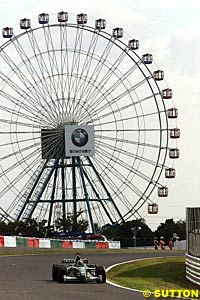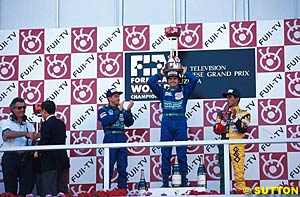
Atlas F1 Magazine Writer
Which record Ferrari can still break, and what record they have no chance of breaking? What driver has always put a great performance at Suzuka, and which driver always had the worst of luck? Marcel Schot brings these answers and more, in the Japanese edition of 'Facts & Stats'
At the height of their record-setting succession, in 1988, McLaren also set the record of scoring 199 points in one season. And while Ferrari eclipsed that tally two weeks ago, it should be noted that nowadays victories are awarded with 10 points - as opposed to 9 back in 1988. Thus, McLaren would have scored 214 points in 16 races - nine more than Ferrari did in their first 16 races of 2002.
The record of points per race average is also out of reach for the Italian team. Another one-two in Suzuka would give Ferrari exactly 13 points per race, while McLaren - if using the current points system - scored an average of 13.38 points per race.
For the upcoming race in Japan, one of the current drivers that most stands out is Eddie Irvine. The Ulsterman finished six of his nine trips to Suzuka in the points, climbing the podium on three occasions. However, last season's Japanese Grand Prix ranks high on Irvine's disaster list: the Jaguar driver came in from seventh after 23 laps for fuel and tyres. The tyres were put on the car perfectly, but the fuel rig wouldn't lock properly so Irvine had to abort that stop and come in again.
In the next lap, now in tenth place, Irvine returned to the pit, only to find out the second fuel rig wouldn't lock as well. This time there was no reserve rig to prepare, resulting in an early retirement in what could very well have been another points finish for the Ulsterman.
A driver who has run into problems at Suzuka one year after another is Jordan driver Giancarlo Fisichella. In the five races he has run on the Japanese circuit, he has yet to score a point. His first race in 1997, also with Jordan, has brought the Italian his best result so far with a seventh place.
In 1999 disaster stuck three times. The start went horrible due to the anti stall kicking in, causing Fisichella to drop from 14th to 16th. A few laps later the Benetton driver went off, damaged his bargeboard and dropped to last place. Moreover, the broken bargeboard made the car nearly undriveable. And, after 47 laps, the engine gave up, ending Fisichella's race.
This final race of the season will be a home coming party for Fisichella's teammate, Takuma Sato. He'll be the first Japanese driver since Tora Takagi in 1999 who will compete in his home Grand Prix. However, it's been much longer since a Japanese driver was successful on home soil.
The last points finish dates back to 1990, when Aguri Suzuki surprisingly put his Lola-Lamborghini in third. In a race that's most famous for the second collision between Alain Prost and Ayrton Senna, Suzuki surprised mostly by clearly staying ahead of both Williamses. The only other Japanese driver to score points at Suzuka was Satoru Nakajima, who finished sixth in 1987 and 1990.
With at least 14 races won this year, Ferrari now have nine consecutive seasons with at least one race win. However, this is not even close to being a record: between 1981 and 1993, McLaren have won in every season, grabbing six Constructors' Championships along the way. After McLaren, there's Lotus with eleven winning seasons, between 1960 and 1970. Ferrari is joint-third, with two successions by Williams, who were only separated by the 1988 season in which the team had to contend with the less than mediocre Judd engine.
McLaren 1981-1993 : 13
Lotus 1960-1970 : 11
Williams 1979-1987 : 9
Williams 1989-1997 : 9
Ferrari 1994-2002 : 9 *
Benetton 1989-1995 : 7
Ferrari 1951-1956 : 6
Tyrrell 1971-1976 : 6
McLaren 1972-1977 : 6
Ferrari 1974-1979 : 6
Brabham 1980-1985 : 6
McLaren 1997-2002 : 6 *
* succession in progress
 However, a one-two at Suzuka would give Ferrari five consecutive 1-2 finishes - a feat only accomplished by the same team in 1952. In fact, a team scoring four consecutive one-twos is already a rarity: Ferrari's current succession is only the fifth in the history of the Formula One World Championship.
However, a one-two at Suzuka would give Ferrari five consecutive 1-2 finishes - a feat only accomplished by the same team in 1952. In fact, a team scoring four consecutive one-twos is already a rarity: Ferrari's current succession is only the fifth in the history of the Formula One World Championship.
 Last year things looked better. After a season from hell for Benetton, Suzuka saw the team much further up the grid than usual. Fisichella qualified sixth, moved to fifth right after the start, only to spin off three laps later, dropping to twelfth. He followed this with a brilliant race, and after his two pitstops the Italian was back up in seventh. Sadly, his race ended six laps from the end when the gearbox dropped the very necessary fourth gear.
Last year things looked better. After a season from hell for Benetton, Suzuka saw the team much further up the grid than usual. Fisichella qualified sixth, moved to fifth right after the start, only to spin off three laps later, dropping to twelfth. He followed this with a brilliant race, and after his two pitstops the Italian was back up in seventh. Sadly, his race ended six laps from the end when the gearbox dropped the very necessary fourth gear.
Past Performance in Japan by Current Drivers
| 1996 | 1997 | 1998 | 1999 | 2000 | 2001 | Average Qualifying Position |
|||||||
| Qual | Race | Qual | Race | Qual | Race | Qual | Race | Qual | Race | Qual | Race | ||
| M.Schumacher | 3 | 2 | 2 | 1 | 1 | M | 1 | 2 | 1 | 1 | 1 | 1 | 1.500 |
| Barrichello | 11 | 9 | 12 | R | 16 | M | 13 | 8 | 4 | 4 | 4 | 5 | 10.000 |
| Coulthard | 8 | 8 | 11 | 10 | 3 | 3 | 3 | M | 3 | 3 | 7 | 3 | 5.833 |
| Raikkonen | - | - | - | - | - | - | - | - | - | - | 12 | R | 12.000 |
| R.Schumacher | - | - | 13 | 9 | 7 | M | 9 | 5 | 6 | M | 3 | 6 | 7.600 |
| Montoya | - | - | - | - | - | - | - | - | - | - | 2 | 2 | 2.000 |
| Heidfeld | - | - | - | - | - | - | - | - | 16 | M | 10 | 9 | 8.000 |
| Massa | - | - | - | - | - | - | - | - | - | - | - | - | - |
| Fisichella | - | - | 9 | 7 | 10 | 8 | 14 | 14 | 12 | 14 | 6 | 17 | 10.200 |
| Sato | - | - | - | - | - | - | - | - | - | - | - | - | - |
| Villeneuve | 1 | M | 1 | DQ | 6 | 6 | 11 | 9 | 9 | 6 | 14 | 10 | 7.000 |
| Panis | 12 | 7 | 10 | M | 13 | 11 | 6 | M | - | - | 17 | 13 | 11.600 |
| Trulli | - | - | - | - | 14 | 12 | 7 | M | 15 | 8 | 8 | 8 | 11.000 |
| Button | - | - | - | - | - | - | - | - | 5 | 5 | 9 | 7 | 7.000 |
| Irvine | 6 | R | 3 | 3 | 4 | 2 | 5 | 3 | 7 | 8 | 13 | M | 6.333 |
| de la Rosa | - | - | - | - | - | - | 21 | 13 | 13 | 12 | 16 | M | 16.666 |
| Yoong | - | - | - | - | - | - | - | - | - | - | 22 | 16 | 22.000 |
| Webber | - | - | - | - | - | - | - | - | - | - | - | - | - |
| Salo | 15 | M | 21 | M | 15 | M | - | - | 19 | 10 | - | - | 17.500 |
| McNish | - | - | - | - | - | - | - | - | - | - | - | - | - |
Please Contact Us for permission to republish this or any other material from Atlas F1.
|
Volume 8, Issue 41
Atlas F1 Exclusive
Niki Lauda: No Boundaries
Renault's Off Season
Jo Ramirez: a Racing Man
Japanese GP Preview
Japanese GP Preview
Local History: Japanese GP
Japan Facts & Stats
Columns
The Japanese GP Quiz
Bookworm Critique
Rear View Mirror
Elsewhere in Racing
The Grapevine
> Homepage |